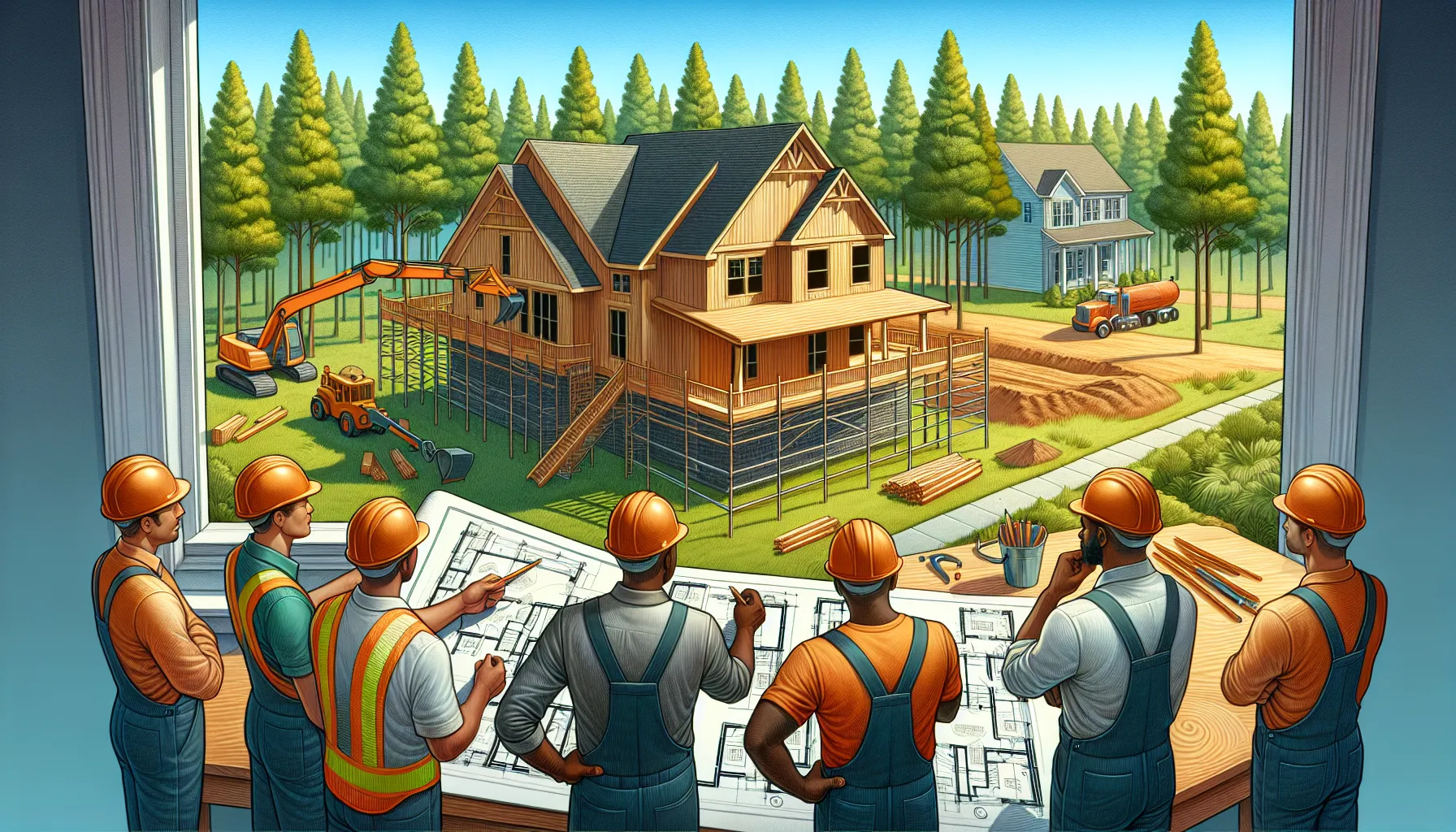Key Takeaways
- The average cost of building a house in North Carolina involves multiple factors, including location, materials, and labor, with significant variations across urban and rural areas.
- Urban areas like Charlotte and Raleigh tend to have higher construction costs due to increased demand, while rural regions offer more budget-friendly options.
- The choice of construction materials significantly impacts budget; high-quality options raise costs but can provide long-term savings with energy efficiency, while standard materials are more affordable.
- Labor costs in North Carolina range from $35 to $75 per hour, varying by region and the skill level required, making it essential to balance costs with the quality of workmanship.
- Building permits can add $1,000 to $5,000 or more to the overall expense, depending on project complexity, emphasizing the importance of understanding local regulations.
- Comprehensive research into construction costs and market trends is crucial for informed decision-making and financial planning for potential homeowners in 2025.
As we look ahead to 2025, understanding the average cost to build a house in North Carolina becomes crucial for potential homeowners and builders alike. With the state’s growing popularity, many are eager to dive into the real estate market. But what can we expect in terms of expenses?
Building a home involves more than just land and materials; it includes labor costs, permits, and design choices that can all impact the final price. By exploring these factors, we can help you navigate the complexities of home construction in North Carolina. Join us as we break down the costs and provide insights to make informed decisions in your home-building journey.
Overview of Home Building Costs in North Carolina
Home building costs in North Carolina vary significantly based on several factors. We’re looking at aspects such as location, materials, and labor costs, all of which play crucial roles in determining the overall price. In urban areas like Charlotte and Raleigh, construction expenses tend to be higher due to increased demand. In contrast, more rural regions may offer lower costs, providing options for budget-conscious homeowners.
The choice of materials directly influences expenses. High-quality materials like brick or stone can elevate costs, while standard options such as vinyl siding may reduce them. We often advise clients to balance quality and budget by carefully choosing materials, ensuring durability without overspending. For instance, investing in energy-efficient windows can save money in the long run by reducing utility bills.
Labor costs also fluctuate across North Carolina. Regions with a higher density of skilled labor may experience increased wages. Typically, homeowners face costs ranging from $35 to $75 per hour for skilled labor, depending on the specialties required. A thorough understanding of labor expenses can help in creating a realistic budget for construction projects.
Permits and design choices contribute additional layers to building costs. In North Carolina, building permits can cost anywhere from a few hundred to several thousand dollars, depending on the project’s scope. Design preferences, such as open floor plans or customized features, can affect both upfront expenditures and future resale value. Carefully evaluating these components can lead to informed decision-making.
As we approach 2025, it’s essential to remain aware of market trends and economic conditions influencing home building costs. Potential homeowners and builders benefit from thorough research, giving insights into real-time expenses and potential savings. Understanding these factors helps us navigate the complex landscape of home construction effectively, ensuring an informed investment for our future.
Factors Influencing Costs

Understanding the factors influencing home-building costs in North Carolina is vital for potential homeowners as we approach 2025. Several elements play a crucial role in shaping these expenses, including land acquisition, construction materials, and labor costs.
Land Acquisition
Land acquisition presents a significant initial expense in the home-building process. We observe that prices vary widely based on location, size, and zoning regulations. Urban areas, such as Charlotte and Raleigh, often command higher prices due to demand and limited availability, whereas rural regions typically offer more budget-friendly options. Additionally, factors like proximity to schools or amenities can further impact land prices. Thorough research into comparable properties can help us gauge fair market values and make informed purchase decisions.
Construction Materials
Construction materials significantly impact overall building costs. We can choose from a range of options, from high-end finishes to more affordable standard materials. For instance, using granite countertops and hardwood flooring elevates costs, while laminate surfaces and vinyl flooring present budget-friendly alternatives. As sustainability becomes a growing concern, eco-friendly materials could lead to long-term savings on energy and maintenance, albeit at a potentially higher upfront cost. Evaluating material choices ensures that our investments align with both budget constraints and design preferences.
Labor Costs
Labor costs directly affect the total budget for building a house. We find that skilled labor rates vary by region, typically ranging from $35 to $75 per hour. This variance arises from factors such as experience, demand, and specialization within the workforce. Hiring licensed contractors and experienced tradespeople might elevate costs but ensures quality workmanship and adherence to local building codes. We must assess trade-offs between hiring the lowest bidder and investing in skilled labor to provide long-term value and satisfaction with our home. Understanding these nuances enables us to plan effectively for labor expenses in our construction budgets.
Regional Cost Variations

Understanding the regional cost variations in North Carolina provides clarity for potential homebuyers as they approach 2025. Factors like location, demand, and available resources significantly influence the overall cost of building a house.
Coastal Areas
Coastal areas in North Carolina, such as Wilmington and the Outer Banks, often experience higher construction costs due to their desirable locations. The demand for beachfront properties increases land prices, with average costs ranging from $100,000 to $500,000 per lot depending on proximity to the ocean. Additionally, local building codes and regulations may require specific materials to withstand hurricanes and flooding, further increasing expenses. Skilled labor availability also affects costs, with typical rates for contractors running from $40 to $80 per hour. Buyers in these regions should budget for both higher land acquisition and construction expenses to achieve their dream home.
Urban vs. Rural
Urban areas like Charlotte and Raleigh demonstrate a stark contrast to rural regions in terms of building costs. Urban development creates heightened demand for housing, which raises land prices from $150,000 to over $700,000 for lots in prime locations. Construction materials can also be pricier in urban centers due to limited options and enhanced demand for high-quality finishes. In contrast, rural areas tend to offer much lower land costs, often between $20,000 and $100,000 for larger lots. Labor rates continue to differ as well, with rural skilled labor averaging $30 to $50 per hour. Those considering homebuilding must weigh these urban-rural dynamics to determine the best fit for their budget and lifestyle.
Cost Breakdown
Understanding the construction costs associated with building a house in North Carolina helps us make informed decisions. We detail the key components that contribute to the overall expenses below.
Permits and Fees
Permits and fees significantly impact the overall cost of building a house. We must factor in permits for zoning, building, electrical, plumbing, and mechanical work, which can range from $1,000 to $5,000 depending on the complexity and location of the project. Local jurisdictions often require inspections throughout the building process, incurring additional costs. For example, the city of Charlotte imposes a variety of fees based on the type of permit and square footage. Comprehensive understanding of these requirements ensures we avoid unexpected expenses and delays.
Design and Architecture
Design and architecture fees contribute substantially to construction costs. We observe that hiring an architect or designer typically ranges from 5% to 15% of the total project cost. For a $300,000 home, this could mean spending between $15,000 and $45,000 on design services. Customized design choices, including sustainable features and high-end materials, can elevate these costs even further. It’s essential to evaluate the trade-offs between aesthetic preferences and budget constraints, ensuring that our dreams don’t outpace our financial capabilities.
Construction Phases
Construction phases encompass several stages, each with associated costs. We need to account for site preparation, foundation, framing, roofing, and finishing work. Site preparation can average $5,000 to $25,000, while framing might add another $10,000 to $30,000, depending on the home size. Other phases, such as roofing and finishing, can vary widely based on material choices, with high-end roofs costing $10,000 or more. A clear timeline and a detailed budget guide us through these phases, helping us to stay on track and within our financial limits.
Conclusion
Building a house in North Carolina as we approach 2025 presents both challenges and opportunities. By understanding the average costs and the factors that influence them we can make informed decisions that align with our budgets and preferences.
Whether we’re drawn to urban centers or the tranquility of rural areas careful planning and research will be essential. As we navigate land acquisition labor rates and material choices we’ll position ourselves for success in this dynamic real estate landscape.
Staying updated on market trends and cost fluctuations will empower us to build not just a house but a home that meets our needs and dreams.
Frequently Asked Questions
What is the average cost of building a house in North Carolina?
The average cost of building a house in North Carolina can vary widely based on location, materials, and labor. Generally, prices range from $150,000 to over $700,000, with urban areas like Charlotte and Raleigh being on the higher end.
What factors influence home-building costs in North Carolina?
Home-building costs in North Carolina are influenced by several factors including land prices, materials, labor rates, and permits. Each of these elements can significantly impact the overall budget and should be carefully considered.
Are labor costs the same across North Carolina?
No, labor costs vary significantly across the state. Skilled labor rates can range from $30 to $75 per hour depending on the region and the specialty required for the construction project.
How does location affect building costs?
Location greatly affects building costs. Urban areas typically have higher land and labor costs due to increased demand, while rural regions often provide more budget-friendly options for home construction.
What are the main components contributing to construction costs?
Key components contributing to construction costs include land acquisition, materials, labor, permits, and design fees. Each component can vary significantly based on location and project specifics, impacting the total budget.
What are typical permit costs for building a house?
Permit costs for building a house can range from $1,000 to $5,000, depending on the complexity of the project and the local regulations. It’s essential to budget for these costs early in the planning process.
How can I manage construction costs effectively?
To manage construction costs effectively, create a clear timeline and detailed budget. Evaluate all components—land, materials, labor, and permits—and consider working with a reliable contractor who can provide accurate estimates and guidance.






